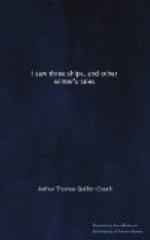As the ship struck, night closed down again, and her agony, sharp or lingering, was blotted out. There was no help possible; no arm that could throw across the three hundred yards that separated her from the cliffs; no swimmer that could carry a rope across those breakers; nor any boat that could, with a chance of life, put out among them. Now and then a dull crash divided the dark hours, but no human cry again reached the shore.
Day broke on a grey sea still running angrily, a tired and shivering group upon the beach, and on the near side of the Raney a shapeless fragment, pounded and washed to and fro—a relic on which the watchers could in their minds re-build the tragedy.
The Raney presents a sheer edge to seaward—an edge under which the first vessel, though almost grazing her side, had driven in plenty of water. Shorewards, however, it descends by gradual ledges. Beguiled by the bonfire, or mistaking Ruby’s lantern for the tossing stern-light of a comrade, the second ship had charged full-tilt on the reef and hung herself upon it, as a hunter across a fence. Before she could swing round, her back was broken; her stern parted, slipped back and settled in many fathoms; while the fore-part heaved forwards, toppled down the reef till it stuck, and there was slowly brayed into pieces by the seas. The tide had swept up and ebbed without dislodging it, and now was almost at low-water mark.
“’May so well go home to breakfast,” said Elias Sweetland, grimly, as he took in what the uncertain light could show.
“Here, Young Zeb, look through my glass,” sang out Farmer Tresidder, handing the telescope. He had been up at the vicarage drinking hot grog with the parson and the rescued men, when Sim Udy ran up with news of the fresh disaster; and his first business on descending to the Cove had been to pack Ruby and Mary Jane off to bed with a sound rating. Parson Babbage had descended also, carrying a heavy cane (the very same with which he broke the head of a Radical agitator in the bar of the “Jolly Pilchards,” to the mild scandal of the diocese), and had routed the rest of the women and chastised the drunken. The parson was a remarkable man, and looked it, just now, in spite of the red handkerchief that bound his hat down over his ears.
“Nothing alive there—eh?”
Young Zeb, with a glass at his left eye, answered—
“Nothin’ left but a frame o’ ribs, sir, an’ the foremast hangin’ over, so far as I can see; but ‘tis all a raffle o’ spars and riggin’ close under her side. I’ll tell ’ee better when this wave goes by.”
But the next instant he took down the glass, with a whitened face, and handed it to the parson.
The parson looked too. “Terrible!—terrible!” he said, very slowly, and passed it on to Farmer Tresidder.
“What is it? Where be I to look? Aw, pore chaps—pore chaps! Man alive—but there’s one movin’!”




